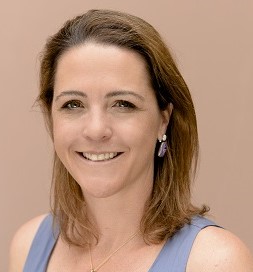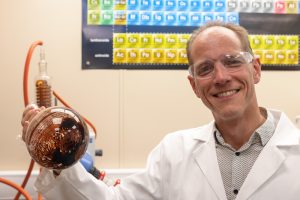
Meet the Team Miranda Lindsay-Fynn, Commercial Director
– The following is the second in our Meet the Team series and an interview with co-founder and commercial director, Miranda Lindsay-Fynn –

A co-founder of Sonichem, Miranda is an experienced entrepreneur and marketing director with extensive sector experience including industrial biotechnology, retail and distribution, and B-2-B corporate services. She leads go-to-market activities, building commercial relationships with downstream chemical partners in the Bio Sep supply chain and heading up all marketing activities.
Can you tell me what you do at Bio-Sep?
I am the commercial director at Bio-Sep, which has two key parts:
1/ The first is building awareness of our sustainable biorefinery technology and our company so that people learn about what we do and how our process works, and the wonderful bio-based products that can be produced. This would be achieved through a mix of attending events, through online promotion and through joining industry associations.
2/ The second part of my role relates to building partnerships and relationships with people that will help us commercialise the technology.
What does Bio-Sep do?
Bio-Sep has developed a unique low energy environmentally friendly technology that will process agricultural waste and forestry waste into bio-chemicals which can then be made into personal care products, pharmaceutical products and all sorts of performance materials products.
We’re core to the circular economy, improving the use of natural resources, as well as providing products that will help the world shift its reliance from petrochemicals into bio-sourced ingredients.
What excites you most about your role at Bio-Sep?
I love being on the front end of it – I’m telling the story, I’m pitching the tech, I’m getting people excited about what we do, and it’s amazing seeing people’s reactions.
The impact that we can have in the forestry sector, in the consumer sector, and how integral our tech will be to a sort of clean low carbon environment is really exciting. It’s also amazing seeing, seeing how much the world is changing and moving towards that.
I’ve been involved in the company for five years now, and the shift from previously talking to companies where it was all a bit focused on bioplastics and no one was quite sure how to use the bio-sourced products. Whereas now, we’ve got people clamouring at the door – they want us for cosmetics, they want us for food production, they want us for materials for these clever applications and it’s quite amazing to be part of that movement.
At the most basic level, what is exciting is that we’re taking materials that are often burnt or considered waste, e.g. sawdust, chippings, agricultural residues and creating chemicals that can be used instead, which is a much smarter way of doing things right.
We’re helping the world improve its use of its resources which are already stretched under a burgeoning population, consumption excess, and producing great environmentally friendly products. It’s a fantastic technology- the world needs us!
The technology was originally developed by a chemist whose background was in sugar production and he saw the waste from sugar cane production. The Bagasse (or the leftover sugar cane), which is over 50% of the plant, was just left to rot or burn. He started looking at tech that will break down the woody biomass; the fibrous part of the sugar cane and developed this technology.
Because we are located in Europe, forestry is the major issue where they’re looking at the moment to try and make it more sustainable, to try and make sure that all of the trees can be used as a product and even better a carbon sink.
Presently most of the by-products or leftovers are burned as CHP pellets actually but, you know, down the line, we will look at upcycling all sorts of alternative materials. I spent several years living in Asia, and the smog that used to hit Singapore from the burning of palm fronds every year is terrible. We could actually take those fronds and put them through our technology process and fractionate them into these fantastic biochemical products, rather than the current scenario of burning and creating pollution. So there are huge global potential applications beyond forestry with economic and environmental benefits.
What type of partners are likely to find what you do of interest?
We are an enabling technology, which means that we will enable the forestry producer or the agriculture producer, to turn their product into biochemicals so for that we need input partners. We are currently talking to several interesting Scottish companies about potentially putting our first commercial plants, alongside their milling operations with their biomass input.
We’re also talking to various engineering partners who have been following our tech for at least five years now. One, in particular, I’ve met through various associations and they’re really keen to help us scale it up and develop the first plans for the plant.
We’re also talking to chemical companies, and this might be someone who would take our product straight away, it might be the brand with the end-consumer products, the people making scents and perfumes and cosmetics. We need the value chain all linked up to make sure that the input knows where it’s going at the end.
A lot of companies are trying to shift towards bio-sourced chemicals; they just don’t have the supply at the moment. And if they do, a lot of biochemicals so far are coming from actual food sources, food-grade biomass such as sugar and corn.
And many companies don’t want that; they’d rather it be from waste biomass.
So, there’s a lot of interest and there’s a lot of people preparing to go that way, they just need the chemicals which come from technology such as ours.
How does Bio-Sep fit into the government policy in the UK?
Government policy is trying to improve resources and to move to a zero-carbon industry. We will be producing chemicals that have a much lower carbon footprint than your petrochemical alternatives or even certain other food-based ones.
Zero Waste Scotland is looking at their underutilised resources such as the byproduct of forestry. How can they make better use of it which creates jobs, or create a new economy in Scotland, it would create new products coming out of Scotland. We’ve had some really interesting talks with the likes of Scottish Enterprise who are the body that partnered with Zero Waste Scotland on how they can help us put our tech in Scotland to fit with their policies of creating biorefineries to better utilise their resources.
We’ve got a lot of support and encouragement and help from them because they need technology such as ours to fulfil their goals.
The way we see it, our approach is appealing as producing products such as ours which will remain a carbon sink because they’re not going to get burnt, they might be retained in a particular material or product or in a food product or anything but you’re not going to be releasing the carbon that’s grown basically.
How do you view your next few years at Bio-Sep?
We’ve spent close to a decade developing and fine-tuning this technology. Right now we’ve got it into a position to scale and that’s super exciting. We have just secured our next round of financing, which will enable us to design our first commercial plant and develop the partnerships to commercialise the operation, most likely in Scotland so it’s all guns blazing.
Our team has been growing at a rate of knots. We’ve got some brilliant people now in that team, so that’s great. And, we’re getting exposure. Last year we won a really exciting competition, the Enabling Technologies Award from the Royal Society of Chemistry, which opened huge doors for us and gave us the vital support we need so that’s exciting as well.






